- Home
- Joseph Conrad
The Heart of Darkness and the Secret Sharer Page 7
The Heart of Darkness and the Secret Sharer Read online
Page 7
I was standing quietly by the pantry door when the steward returned.
‘‘Sorry, sir. Kettle barely warm. Shall I light the spirit lamp?’’
‘‘Never mind.’’
I came out on deck slowly. It was now a matter of conscience to shave the land as close as possible—for now he must go overboard whenever the ship was put in stays. Must! There could be no going back for him. After a moment I walked over to leeward and my heart flew into my mouth at the nearness of the land on the bow. Under any other circumstances I would not have held on a minute longer. The second mate had followed me anxiously.
I looked on till I felt I could command my voice.
‘‘She will weather,’’ I said then in a quiet tone.
‘‘Are you going to try that, sir?’’ he stammered out incredulously.
I took no notice of him and raised my tone just enough to be heard by the helmsman.
‘‘Keep her good full.’’
‘‘Good full, sir.’’
The wind fanned my cheek, the sails slept, the world was silent. The strain of watching the dark loom of the land grow bigger and denser was too much for me. I had shut my eyes—because the ship must go closer. She must! The stillness was intolerable. Were we standing still?
When I opened my eyes the second view started my heart with a thump. The black southern hill of Koh-ring seemed to hang right over the ship like a towering fragment of the ever-lasting night. On that enormous mass of blackness there was not a gleam to be seen, not a sound to be heard. It was gliding irresistibly towards us and yet seemed already within reach of the hand. I saw the vague figures of the watch grouped in the waist, gazing in awed silence.
‘‘Are you going on, sir?’’ inquired an unsteady voice at my elbow.
I ignored it. I had to go on.
‘‘Keep her full. Don’t check her way. That won’t do now,’’ I said, warningly.
‘‘I can’t see the sails very well,’’ the helmsman answered me, in strange, quavering tones.
Was she close enough? Already she was, I won’t say in the shadow of the land, but in the very blackness of it, already swallowed up as it were, gone too close to be recalled, gone from me altogether.
‘‘Give the mate a call,’’ I said to the young man who stood at my elbow as still as death. ‘‘And turn all hands up.’’
My tone had a borrowed loudness reverberated from the height of the land. Several voices cried out together: ‘‘We are all on deck, sir.’’
Then stillness again, with the great shadow gliding closer, towering higher, without a light, without a sound. Such a hush had fallen on the ship that she might have been a bark of the dead floating in slowly under the very gate of Erebus.
‘‘My God! Where are we?’’
It was the mate moaning at my elbow. He was thunder-struck, and as it were deprived of the moral support of his whiskers. He clapped his hands and absolutely cried out, ‘‘Lost!’’
‘‘Be quiet,’’ I said, sternly.
He lowered his tone, but I saw the shadowy gesture of his despair. ‘‘What are we doing here?’’
‘‘Looking for the land wind.’’
He made as if to tear his hair, and addressed me recklessly.
‘‘She will never get out. You have done it, sir. I knew it’d end in something like this. She will never weather, and you are too close now to stay. She’ll drift ashore before she’s round. O my God!’’
I caught his arm as he was raising it to batter his poor devoted head, and shook it violently.
‘‘She’s ashore already,’’ he wailed, trying to tear himself away.
‘‘Is she? . . . Keep good full there!’’
‘‘Good full, sir,’’ cried the helmsman in a frightened, thin, childlike voice.
I hadn’t let go the mate’s arm and went on shaking it. ‘‘Ready about, do you hear? You go forward’’— shake—‘‘and stop there’’—shake—‘‘and hold your noise’’—shake—‘‘and see these head-sheets properly overhauled’’—shake, shake—shake.
And all the time I dared not look towards the land lest my heart should fail me. I released my grip at last and he ran forward as if fleeing for dear life.
I wondered what my double there in the sail locker thought of this commotion. He was able to hear everything—and perhaps he was able to understand why, on my conscience, it had to be thus close—no less. My first order ‘‘Hard alee!’’ re-echoed ominously under the towering shadow of Koh-ring as if I had shouted in a mountain gorge. And then I watched the land intently. In that smooth water and light wind it was impossible to feel the ship coming-to. No! I could not feel her. And my second self was making now ready to ship out and lower himself overboard. Perhaps he was gone already . . . ?
The great black mass brooding over our very mastheads began to pivot away from the ship’s side silently. And now I forgot the secret stranger ready to depart, and remembered only that I was a total stranger to the ship. I did not know her. Would she do it? How was she to be handled?
I swung the mainyard and waited helplessly. She was perhaps stopped, and her very fate hung in the balance, with the black mass of Koh-ring like the gate of the everlasting night towering over her taffrail. What would she do now? Had she way on her yet? I stepped to the side swiftly, and on the shadowy water I could see nothing except a faint phosphorescent flash revealing the glassy smoothness of the sleeping surface. It was impossible to tell—and I had not learned yet the feel of my ship. Was she moving? What I needed was something easily seen, a piece of paper, which I could throw overboard and watch. I had nothing on me. To run down for it I didn’t dare. There was no time. All at once my strained, yearning stare distinguished a white object floating within a yard of the ship’s side. White on the black water. A phosphorescent flash passed under it. What was that thing? . . . I recognized my own floppy hat. It must have fallen off his head . . . and he didn’t bother. Now I had what I wanted—the saving mark for my eyes. But I hardly thought of my other self, now gone from the ship, to be hidden forever from all friendly faces, to be a fugitive and a vagabond on the earth, with no brand of the curse on his sane forehead to stay a slaying hand . . . too proud to explain.
And I watched the hat—the expression of my sudden pity for his mere flesh. It had been meant to save his homeless head from the dangers of the sun. And now—behold—it was saving the ship, by serving me for a mark to help out the ignorance of my strangeness. Ha! It was drifting forward, warning me just in time that the ship had gathered sternway.
‘‘Shift the helm,’’ I said in a low voice to the seaman standing still like a statue.
The man’s eyes glistened wildly in the binnacle light as he jumped round to the other side and spun round the wheel.
I walked to the break of the poop. On the overshadowed deck all hands stood by the forebraces waiting for my order. The stars ahead seemed to be gliding from right to left. And all was so still in the world that I heard the quiet remark, ‘‘She’s round,’’ passed in a tone of intense relief between two seamen.
‘‘Let go and haul.’’
The foreyards ran round with a great noise, amidst cheery cries. And now the frightful whiskers made themselves heard giving various orders. Already the ship was drawing ahead. And I was alone with her. Nothing! no one in the world should stand now between us, throwing a shadow on the way of silent knowledge and mute affection, the perfect communion of a seaman with his first command.
Walking to the taffrail, I was in time to make out, on the very edge of a darkness thrown by a towering black mass like the very gateway of Erebus—yes, I was in time to catch an evanescent glimpse of my white hat left behind to mark the spot where the secret sharer of my cabin and of my thoughts, as though he were my second self, had lowered himself into the water to take his punishment: a free man, a proud swimmer striking out for a new destiny.
Heart of Darkness
I
The Nellie, a cruising yawl, swung to her an
chor without a flutter of the sails, and was at rest. The flood had made, the wind was nearly calm, and being bound down the river, the only thing for it was to come to and wait for the turn of the tide.
The sea-reach of the Thames stretched before us like the beginning of an interminable waterway. In the offing the sea and the sky were welded together without a joint, and in the luminous space the tanned sails of the barges drifting up with the tide seemed to stand still in red clusters of canvas sharply peaked, with gleams of varnished sprits. A haze rested on the low shores that ran out to sea in vanishing flatness. The air was dark above Gravesend, and farther back still seemed condensed into a mournful gloom, brooding motionless over the biggest, and the greatest, town on earth.
The Director of Companies was our captain and our host. We four affectionately watched his back as he stood in the bows looking to seaward. On the whole river there was nothing that looked half so nautical. He resembled a pilot, which to a seaman is trustworthiness personified. It was difficult to realize his work was not out there in the luminous estuary, but behind him, within the brooding gloom.
Between us there was, as I have already said somewhere, the bond of the sea. Besides holding our hearts together through long periods of separation, it had the effect of making us tolerant of each other’s yarns— and even convictions. The Lawyer—the best of old fellows—had, because of his many years and many virtues, the only cushion on deck, and was lying on the only rug. The Accountant had brought out already a box of dominoes, and was toying architecturally with the bones. Marlow sat cross-legged right aft, leaning against the mizzen-mast. He had sunken cheeks, a yellow complexion, a straight back, an ascetic aspect, and, with his arms dropped, the palms of hands outwards, resembled an idol. The director, satisfied the anchor had good hold, made his way aft and sat down amongst us. We exchanged a few words lazily. Afterwards there was silence on board the yacht. For some reason or other we did not begin that game of dominoes. We felt meditative, and fit for nothing but placid staring. The day was ending in a serenity of still and exquisite brilliance. The water shone pacifically; the sky, without a speck, was a benign immensity of unstained light; the very mist on the Essex marsh was like a gauzy and radiant fabric, hung from the wooded rises inland, and draping the low shores in diaphanous folds. Only the gloom to the west, brooding over the upper reaches, became more sombre every minute, as if angered by the approach of the sun.
And at last, in its curved and imperceptible fall, the sun sank low, and from glowing white changed to a dull red without rays and without heat, as if about to go out suddenly, stricken to death by the touch of that gloom brooding over a crowd of men.
Forthwith a change came over the waters, and the serenity became less brilliant but more profound. The old river in its broad reach rested unruffled at the decline of day, after ages of good service done to the race that peopled its banks, spread out in the tranquil dignity of a waterway leading to the uttermost ends of the earth. We looked at the venerable stream not in the vivid flush of a short day that comes and departs for ever, but in the august light of abiding memories. And indeed nothing is easier for a man who has, as the phrase goes, ‘‘followed the sea’’ with reverence and affection, than to evoke the great spirit of the past upon the lower reaches of the Thames. The tidal current runs to and fro in its unceasing service, crowded with memories of men and ships it had borne to the rest of home or to the battles of the sea. It had known and served all the men of whom the nation is proud, from Sir Francis Drake to Sir John Franklin, knights all, titled and untitled—the great knights-errant of the sea. It had borne all the ships whose names are like jewels flashing in the night of time, from the Golden Hind returning with her round flanks full of treasure, to be visited by the Queen’s Highness and thus pass out of the gigantic tale, to the Erebus and Terror, bound on other conquests—and that never returned. It had known the ships and the men. They had sailed from Deptford, from Greenwich, from Erith—the adventurers and the settlers; kings’ ships and the ships of men on ’Change; captains, admirals, the dark ‘‘interlopers’’ of the Eastern trade, and the commissioned ‘‘generals’’ of East India fleets. Hunters for gold or pursuers of fame, they all had gone out on that stream, bearing the sword, and often the torch, messengers of the might within the land, bearers of a spark from the sacred fire. What greatness had not floated on the ebb of that river into the mystery of an unknown earth! . . . The dreams of men, the seed of commonwealths, the germs of empires.
The sun set; the dusk fell on the stream, and lights began to appear along the shore. The Chapman light-house, a three-legged thing erect on a mud-flat, shone strongly. Lights of ships moved in the fairway—a great stir of lights going up and going down. And further west on the upper reaches the place of the monstrous town was still marked ominously on the sky, a brooding gloom in sunshine, a lurid glare under the stars.
‘‘And this also,’’ said Marlow suddenly, ‘‘has been one of the dark places of the earth.’’
He was the only man of us who still ‘‘followed the sea.’’ The worst that could be said of him was that he did not represent his class. He was a seaman, but he was a wanderer, too, while most seamen lead, if one may so express it, a sedentary life. Their minds are of the stay-at-home order, and their home is always with them—the ship; and so is their country—the sea. One ship is very much like another, and the sea is always the same. In the immutability of their surroundings the foreign shores, the foreign faces, the changing immensity of life, glide past, veiled not by a sense of mystery but by a slightly disdainful ignorance; for there is nothing mysterious to a seaman unless it be the sea itself, which is the mistress of his existence and as inscrutable as Destiny. For the rest, after his hours of work, a casual stroll or a casual spree on shore suffices to unfold for him the secret of a whole continent, and generally he finds the secret not worth knowing. The yarns of seamen have a direct simplicity, the whole meaning of which lies within the shell of a cracked nut. But Marlow was not typical (if his propensity to spin yarns be excepted), and to him the meaning of an episode was not inside like a kernel but outside, enveloping the tale which brought it out only as a glow brings out a haze, in the likeness of one of these misty halos that sometimes are made visible by the spectral illumination of moonshine.
His remark did not seem at all surprising. It was just like Marlow. It was accepted in silence. No one took the trouble to grunt even; and presently he said, very slow—
‘‘I was thinking of very old times, when the Romans first came here, nineteen hundred years ago—the other day. . . . Light came out of this river since—you say knights? Yes; but it is like a running blaze on a plain, like a flash of lightning in the clouds. We live in the flicker—may it last as long as the old earth keeps rolling! But darkness was here yesterday. Imagine the feelings of a commander of a fine—what d’ye call ’em?—trireme in the Mediterranean, ordered suddenly to the north; run overland across the Gauls in a hurry; put in charge of one of these craft the legionaries—a wonderful lot of handy men they must have been, too—used to build, apparently by the hundred, in a month or two, if we may believe what we read. Imagine him here—the very end of the world, a sea the colour of lead, a sky the colour of smoke, a kind of ship about as rigid as a concertina—and going up this river with stores, or orders, or what you like. Sand-banks, marshes, forests, savages,—precious little to eat fit for a civilized man, nothing but Thames water to drink. No Falernian wine here, no going ashore. Here and there a military camp lost in the wilderness, like a needle in a bundle of hay—cold, fog, tempests, disease, exile, and death—death skulking in the air, in the water, in the bush. They must have been dying like flies here. Oh, yes—he did it. Did it very well, too, no doubt, and without thinking much about it either, except afterwards to brag of what he had gone through in his time, perhaps. They were men enough to face the darkness. And perhaps he was cheered by keeping his eye on a chance of promotion to the fleet at Ravenna by and by, if he had good frien
ds in Rome and survived the awful climate. Or think of a decent young citizen in a toga—perhaps too much dice, you know—coming out here in the train of some prefect, or tax-gatherer, or trader even, to mend his fortunes. Land in a swamp, march through the woods, and in some inland post feel the savagery, the utter savagery, had closed round him—all that mysterious life of the wilderness that stirs in the forest, in the jungles, in the hearts of wild men. There’s no initiation either into such mysteries. He has to live in the midst of the incomprehensible, which is also detestable. And it has a fascination, too, that goes to work upon him. The fascination of the abomination— you know, imagine the growing regrets, the longing to escape, the powerless disgust, the surrender, the hate.’’
He paused.
‘‘Mind,’’ he began again, lifting one arm from the elbow, the palm of the hand outwards, so that, with his legs folded before him, he had the pose of a Buddha preaching in European clothes and without a lotus-flower—‘‘Mind, none of us would feel exactly like this. What saves us is efficiency—the devotion to efficiency. But these chaps were not much account, really. They were no colonists; their administration was merely a squeeze, and nothing more, I suspect. They were conquerors, and for that you want only brute force— nothing to boast of, when you have it, since your strength is just an accident arising from the weakness of others. They grabbed what they could get for the sake of what was to be got. It was just robbery with violence, aggravated murder on a great scale, and men going at it blind—as is very proper for those who tackle a darkness. The conquest of the earth, which mostly means the taking it away from those who have a different complexion or slightly flatter noses than ourselves, is not a pretty thing when you look into it too much. What redeems it is the idea only. An idea at the back of it; not a sentimental pretence but an idea; and an unselfish belief in the idea—something you can set up, and bow down before, and offer a sacrifice to. . . .’’

 Heart of Darkness
Heart of Darkness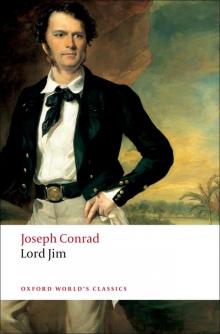 Lord Jim
Lord Jim The Nigger of the Narcissus (Echo Library)
The Nigger of the Narcissus (Echo Library) Victory (Dover Thrift Editions)
Victory (Dover Thrift Editions) Secret Agent
Secret Agent Nostromo
Nostromo Chance: A Tale in Two Parts
Chance: A Tale in Two Parts Youth
Youth Almayer's Folly
Almayer's Folly The Heart of Darkness and the Secret Sharer
The Heart of Darkness and the Secret Sharer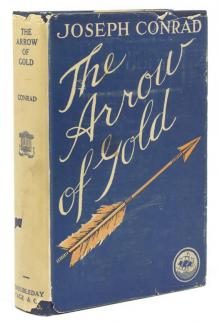 The Arrow of Gold: A Story Between Two Notes
The Arrow of Gold: A Story Between Two Notes The Rescue: A Romance of the Shallows
The Rescue: A Romance of the Shallows The Point Of Honor: A Military Tale
The Point Of Honor: A Military Tale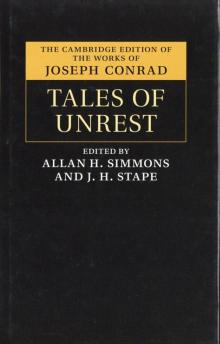 Tales of Unrest
Tales of Unrest Under Western Eyes
Under Western Eyes Gaspar Ruiz
Gaspar Ruiz A Set of Six
A Set of Six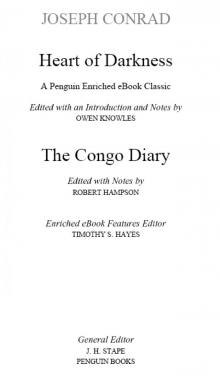 Heart of Darkness and the Congo Diary (Penguin Classics)
Heart of Darkness and the Congo Diary (Penguin Classics) Heart of Darkness and Selected Short Fiction
Heart of Darkness and Selected Short Fiction Typhoon
Typhoon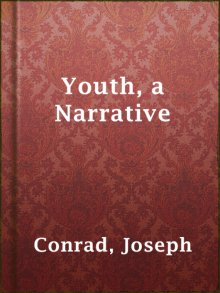 Youth, a Narrative
Youth, a Narrative Tomorrow
Tomorrow The Arrow of Gold
The Arrow of Gold The Shadow Line: A Confession
The Shadow Line: A Confession The Rescue
The Rescue Victory (Echo Library)
Victory (Echo Library) The Brute
The Brute Romance
Romance A Personal Record
A Personal Record Lord Jim: A Tale
Lord Jim: A Tale Heart of Darkness and Selected Short Fiction (Barnes & Noble Classics Series)
Heart of Darkness and Selected Short Fiction (Barnes & Noble Classics Series) Within the Tides
Within the Tides The Secret Sharer and Other Stories
The Secret Sharer and Other Stories Falk
Falk Heart of Darkness and The Secret Sharer
Heart of Darkness and The Secret Sharer Chance
Chance An Anarchist
An Anarchist The Secret Agent: A Simple Tale
The Secret Agent: A Simple Tale The Secret Agent
The Secret Agent Complete Works of Joseph Conrad (Illustrated)
Complete Works of Joseph Conrad (Illustrated)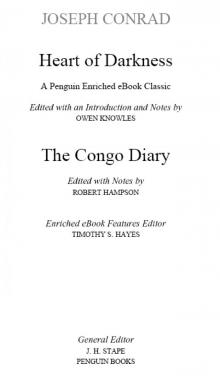 Heart of Darkness and the Congo Diary
Heart of Darkness and the Congo Diary Notes on Life & Letters
Notes on Life & Letters Typhoon (Single Story)
Typhoon (Single Story)